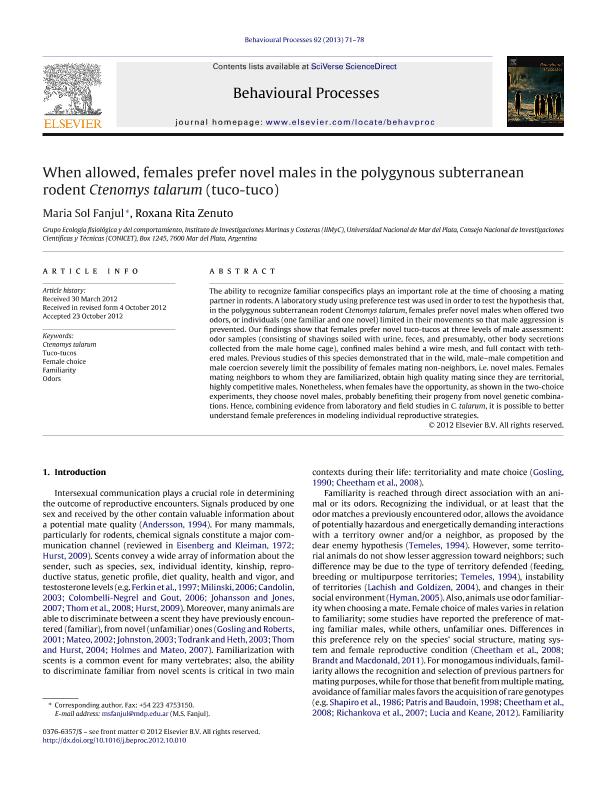Mostrar el registro sencillo del ítem
dc.contributor.author
Fanjul, Maria Sol

dc.contributor.author
Zenuto, Roxana Rita

dc.date.available
2017-10-05T19:29:05Z
dc.date.issued
2013-01
dc.identifier.citation
Fanjul, Maria Sol; Zenuto, Roxana Rita; When allowed, females prefer novel males in the polygynous subterranean rodent Ctenomys talarum (tuco-tuco); Elsevier Science; Behavioural Processes; 92; 1-2013; 71-78
dc.identifier.issn
0376-6357
dc.identifier.uri
http://hdl.handle.net/11336/26022
dc.description.abstract
The ability to recognize familiar conspecifics plays an important role at the time of choosing a mating partner in rodents. A laboratory study using preference test was used in order to test the hypothesis that, in the polygynous subterranean rodent Ctenomys talarum, females prefer novel males when offered two odors, or individuals (one familiar and one novel) limited in their movements so that male aggression is prevented. Our findings show that females prefer novel tuco-tucos at three levels of male assessment: odor samples (consisting of shavings soiled with urine, feces, and presumably, other body secretions collected from the male home cage), confined males behind a wire mesh, and full contact with tethered males. Previous studies of this species demonstrated that in the wild, male–male competition and male coercion severely limit the possibility of females mating non-neighbors, i.e. novel males. Females mating neighbors to whom they are familiarized, obtain high quality mating since they are territorial, highly competitive males. Nonetheless, when females have the opportunity, as shown in the two-choice experiments, they choose novel males, probably benefiting their progeny from novel genetic combinations. Hence, combining evidence from laboratory and field studies in C. talarum, it is possible to better understand female preferences in modeling individual reproductive strategies
dc.format
application/pdf
dc.language.iso
eng
dc.publisher
Elsevier Science

dc.rights
info:eu-repo/semantics/openAccess
dc.rights.uri
https://creativecommons.org/licenses/by-nc-sa/2.5/ar/
dc.subject
Ctenomys Talarum
dc.subject
Tuco-Tucos
dc.subject
Female Choice
dc.subject
Familiarity
dc.subject
Odors
dc.subject.classification
Bioquímica y Biología Molecular

dc.subject.classification
Ciencias Biológicas

dc.subject.classification
CIENCIAS NATURALES Y EXACTAS

dc.title
When allowed, females prefer novel males in the polygynous subterranean rodent Ctenomys talarum (tuco-tuco)
dc.type
info:eu-repo/semantics/article
dc.type
info:ar-repo/semantics/artículo
dc.type
info:eu-repo/semantics/publishedVersion
dc.date.updated
2017-10-03T17:33:27Z
dc.journal.volume
92
dc.journal.pagination
71-78
dc.journal.pais
Países Bajos

dc.journal.ciudad
Amsterdam
dc.description.fil
Fil: Fanjul, Maria Sol. Consejo Nacional de Investigaciones Científicas y Técnicas. Centro Científico Tecnológico Conicet - Mar del Plata. Instituto de Investigaciones Marinas y Costeras. Universidad Nacional de Mar del Plata. Facultad de Ciencia Exactas y Naturales. Instituto de Investigaciones Marinas y Costeras; Argentina
dc.description.fil
Fil: Zenuto, Roxana Rita. Consejo Nacional de Investigaciones Científicas y Técnicas. Centro Científico Tecnológico Conicet - Mar del Plata. Instituto de Investigaciones Marinas y Costeras. Universidad Nacional de Mar del Plata. Facultad de Ciencia Exactas y Naturales. Instituto de Investigaciones Marinas y Costeras; Argentina
dc.journal.title
Behavioural Processes

dc.relation.alternativeid
info:eu-repo/semantics/altIdentifier/url/http://www.sciencedirect.com/science/article/pii/S0376635712002276
dc.relation.alternativeid
info:eu-repo/semantics/altIdentifier/doi/http://dx.doi.org/10.1016/j.beproc.2012.10.010
Archivos asociados
